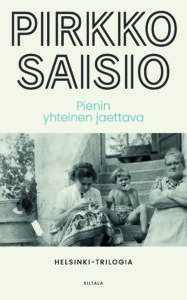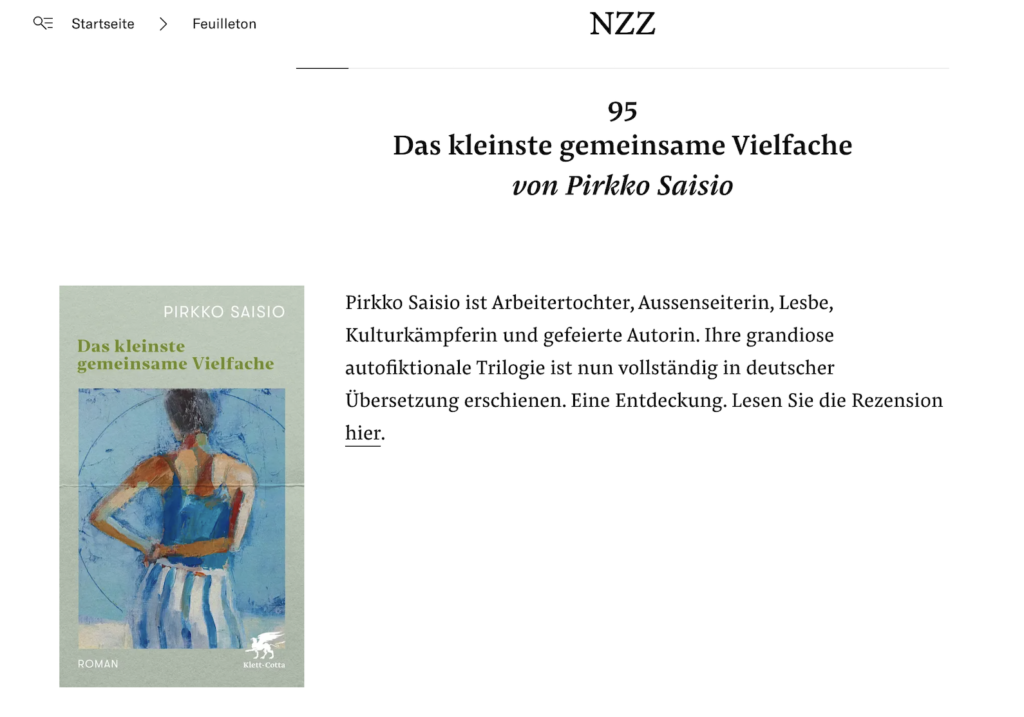
Pirkko Saisio, the grand dame of the Finnish literary and dramatic scene, is continuing to wow the international audience: NZZ am Sonntag is featuring The Lowest Common Multiple (Helsinki Trilogy #1), in German translation by Elina Kritzokat, in its 100 Best Books of the 21st Century list.
NZZ am Sonntag (NZZaS) is a Sunday newspaper that has been published in Zurich since March 2002 and is published by Neue Zürcher Zeitung (NZZ), Switzerland’s most prominent newspaper.
The review praises the book and the trilogy as follows:
“The trilogy changes perspectives as easily
as it switches between decades. These three books are family history and contemporary political history, sexual self-discovery and artist biography. […] Saisio tells in vivid scenes, in key moments, dreams and reflections, which, often without a point in between, associatively glide into one another, realistic and fantastic, full of reality, self-confident, touching and clever, funny and beautiful.”
The Helsinki Trilogy consists of The Lowest Common Multiple, The Backlight, and The Red Book of Farewells. Pirkko Saisio’s autofictional trilogy carries the reader through the childhood, adolescence and adulthood of a girl who wanted to be a boy and started calling herself “her”, becoming both narrator and protagonist of the story of her life, when she was eight years of age.
The trilogy, a modern classic in Finland, awarded with two Finlandia nominations and one Finlandia Prize win, made Saisio the first living Finnish author to be included in the Penguin Modern Classics.
The trilogy starts with The Lowest Common Multiple (1998). In the beginning of the novel, the main character, “she”, is already a middle-aged mother. When her father dies, things get shoved out of their place. Her memories take her back to her childhood in the 1950s – to a story, which is also about to change.
In the second novel, The Backlight (2000), it is 1968, and the main character is travelling to Switzerland to work in an orphanage. With episodes from her grammar school years, the reader follows her navigating the conflict between a leftist upbringing, Christianity, and her awakening sexuality.
The Red Book of Farewells (2003) starts in the politically turbulent 1970s. The main character begins her studies in the Theatre Academy, falls in love with a woman, and enters an adult life where there are to be farewells every now and then.

The strong themes of the trilogy – the relationship between an individual and the society, sexuality and being queer, and finding your voice – are told in a fragmentary, lyrical style, descriptive of Saisio. As the background, there is Helsinki, changing as the decades go by.
The trilogy is out in German with Klett-Cotta, in French with Robert Laffont, De Geus in Dutch, and will a top title on its release with Host in Czech.
Pirkko Saisio has released a new novel this autumn, Suliko, which is a deep, lyrical dive in the mind of a dictator approaching death. In Finland, it is published by Siltala.
Warm thanks to NZZ for the feature, and congratulations to the author!

